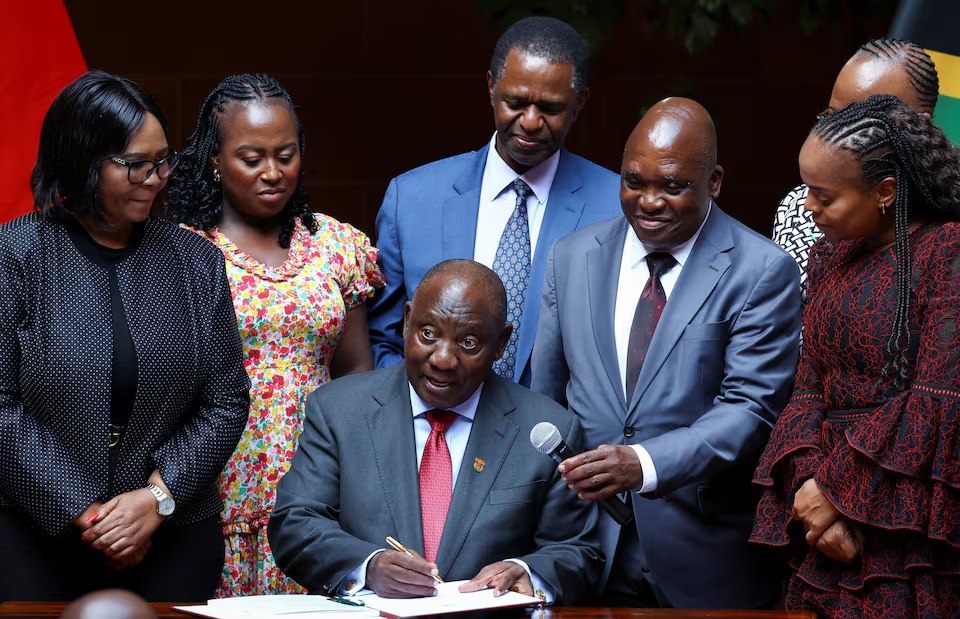
President Cyril Ramaphosa has signed the National Health Insurance (NHI) Bill into law, a significant step aimed at providing equal access to healthcare services and addressing long-standing inequalities in South Africa. This historic move was celebrated by Ramaphosa, who highlighted the bill’s potential to transform the nation’s healthcare system.
“The provision of healthcare in this country is currently fragmented, unsustainable, and unacceptable,” President Ramaphosa stated, noting that the NHI is not only about efficiency and quality but also a commitment to eliminating severe disparities in healthcare access. He emphasised that healthcare provided through the NHI will free up resources for poor families, making healthcare more affordable and accessible.
Also Read: Minister Signals End of Load Shedding in South Africa Within Reach
The NHI aims to create a unified healthcare system where resources are used efficiently to provide comprehensive healthcare services. This will involve the NHI Fund procuring services from both public and private providers, ensuring all South Africans have access to quality healthcare.
Addressing Imbalances and Inefficiencies
President Ramaphosa pointed out that while the public sector serves the majority of the population, it faces budget constraints, unlike the private sector, which serves a smaller fraction of society at a higher cost without proportional improvement in health outcomes. He called for a radical reimagining of resource allocation to address this imbalance.
“The challenge lies not in the lack of funds, but in the misallocation of resources that currently favour the private health sector at the expense of public health needs,” he said. The NHI Bill proposes a comprehensive strategy combining various financial resources, including additional funding and reallocating existing funds within the health system.
A Milestone in South Africa’s Quest for Justice
The signing of the NHI Bill is seen as a pivotal moment in South Africa’s ongoing quest for a more just society. Ramaphosa described it as an opportunity to break away from the inequality and inefficiency that has long characterised the country’s approach to healthcare. He urged the South African people to embrace this future, where healthcare is a shared national treasure reflective of the dignity and value accorded to every citizen.
Implementation and Public Response
The President assured that the NHI would be implemented gradually, rather than as an overnight event, and stressed the importance of collective will and cooperation to make the NHI work. The government has already started implementing a national quality improvement plan in healthcare facilities, with noticeable improvements even in township health facilities.
However, the bill has faced opposition, with critics arguing that it will drain public finances, limit patient choice, and undermine the quality of care. Industry leaders and political analysts predict that the legislation may face legal challenges, particularly concerning its funding model.
Political and Economic Context
The NHI Bill’s signing comes just two weeks before a fiercely competitive election, with the African National Congress (ANC) striving to retain its parliamentary majority. Opponents claim the bill is a ploy for votes, a charge the presidency denies. Despite these claims, the government insists that the National Treasury will determine the funding sources for the NHI, which will include a mandatory pre-payment system and other forms of taxes.
Broader Implications and Future Challenges
The NEHAWU labour union has urged the government to fully support the NHI to ensure it is properly resourced. Meanwhile, the Democratic Alliance (DA), the largest opposition party, criticises the Act for not addressing systemic healthcare issues. Health policy experts warn of the challenges ahead, including South Africa’s high unemployment rate, low tax base, and citizens’ mistrust of government due to repeated corruption scandals.
While the NHI Act is a significant legislative achievement, its successful implementation will depend on careful planning, strategic resource allocation, and overcoming substantial financial and political hurdles. As South Africa embarks on this ambitious journey towards universal healthcare, the government must work diligently to build public trust and ensure that the NHI delivers on its promise of equitable healthcare for all.
Read more
Source: South African Government News Agency
Discover more from One Africa News Today
Subscribe to get the latest posts sent to your email.
